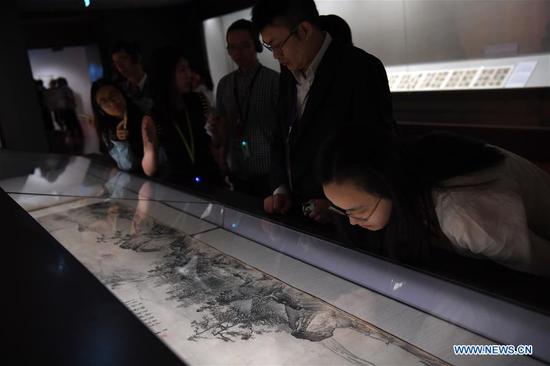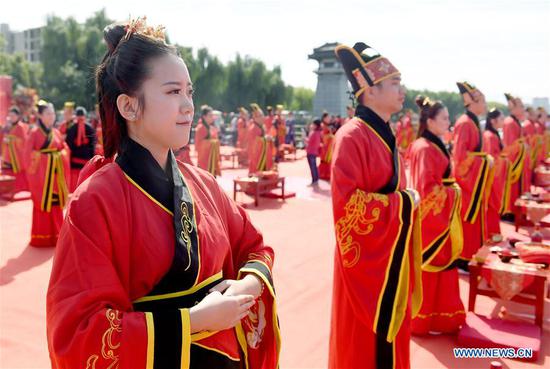
Cast members of online drama The Story of Yanxi Palace pose for a stage photo. (Photo provided to China Daily)
Increased wealth and education, access to internet services, shape new generation's desire for games, animation, drama, films
As the purchasing power of the tech-savvy younger generation grows, a whole new business has emerged surrounding intellectual property rights related to online literature, TV dramas, films, digital games and comics. And that business is gaining momentum all across China.
The pan-entertainment industry has become a key driving force of the nation's economic growth. In 2017, it generated more than 480 billion yuan ($70 billion) in economic output, with an increase of more than 15 percent year-on-year, according to a recent report released by database company Gamma Data Corp.
High-definition smartphone screens, powerful processors, booming mobile internet technologies and multifunction software have made on-screen reading and video-watching more enjoyable and convenient.
Statistics from the China Internet Network Information Center demonstrate the rapid growth of the blossoming internet trend. Data show that among the 772 million Chinese netizens, 97.5 percent are mobile phone users, providing a massive base for the new digital business.
Millennials, particularly those born from 1995 to 2000, are demanding a different entertainment culture than what was popular among their parents.
Chen Rui, chairman of Bilibili, a popular Chinese video-sharing site boasting the largest group of young Chinese anime, comics and gaming fans, said there was a clear difference in the demand for culture and content between the younger generation and their parents' generation.
"The increased material wealth, high-quality education environment and the access to internet services are shaping today's young generation's diversified and personalized cultural needs," Chen said. And those young consumers actually are willing to pay for the entertainment content they really love.
Xue Yongfeng, an analyst at internet consultancy Analysys in Beijing, said that previously, major internet users typically only paid for real-life items, but now, they're willing to pay for virtual online content products.
"With the surge in average incomes and the changing paying habits, now more Chinese netizens are willing to pay for online reading, watching online videos and movies or listening to online music."
Seeing the emerging trend, an increasing number of domestic companies are introducing a wide range of related products targeting the young generation, and many have been reaping the benefits.
Recently, online drama The Story of Yanxi Palace, co-produced by Chinese online video streaming service provider iQiyi.com and Huanyu Film, has gained a huge following among Chinese netizens, becoming another popular screen work featuring concubines in Qing Dynasty. The hit drama has gained more than 15 billion online views, iQiyi claimed. And now it's available in more than 70 markets globally, making it one of the most widely distributed series produced by China.
The TV series has also attracted a growing number of visitors to the Forbidden City as the Palace Museum appeared in the drama. And the lesser-known Yanxi Gong, where the heroine of the drama lived, has become a new hot spot in the museum. And there have been increased orders of reproductions of the heroine's hair ornaments, also led by people's interest in the drama.
Beijing-based iQiyi, an online video unit of Chinese internet giant Baidu Inc, raised $2.25 billion in its initial public offering this year, saying it will use half of the net proceeds to expand and enhance its content offerings.
Ma Shicong, an analyst at Analysys, said key online video participants who invest lots of money to fuel the development of the sector will be rewarded with larger shares of the market.
Founded in 2010, iQiyi reported continuous growth in its revenues, hitting 17.4 billion yuan last year, a significant jump of 54.6 percent over the previous year.
A key driver behind iQiyi's revenue growth is the subscription fees for its online video streaming services. Revenue from the subscription fees accounted for 37.6 percent of its total income in 2017, compared to an 18.7 percent share in 2015.
The company claimed it had more than 50 million subscribers by the end of last year, and about 126 million daily active mobile users during the last quarter of 2017.
"Major tech giants all aim to boost the future development of the video streaming arms to be at the forefront in the Chinese entertainment market. The competition in the sector will become fiercer," Ma added.
Three major Chinese internet giants--Baidu Inc, Alibaba Group Holding Ltd and Tencent Holdings Ltd, collectively known as BAT-are accelerating the push to invest in entertainment units, betting big on the booming domestic market.
Particularly, they've paid attention to online literature genres, which have revolutionized the entertainment industry and triggered a vast array of movies, TV dramas, games, animation and comics. For instance, the mega-hit drama Ten Miles of Peach Blossoms was based on popular online stories.

















































